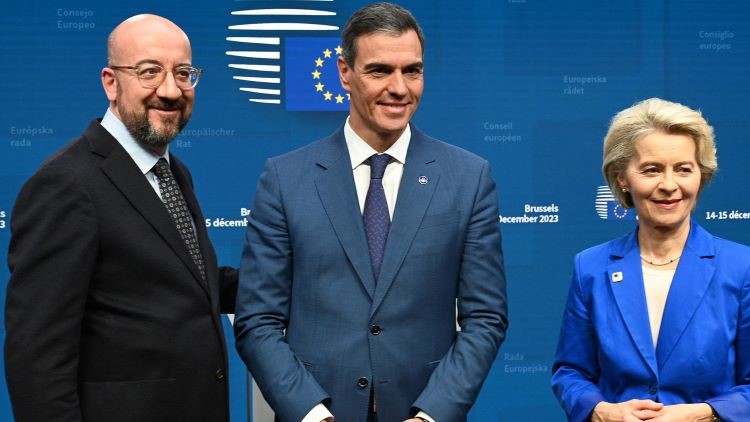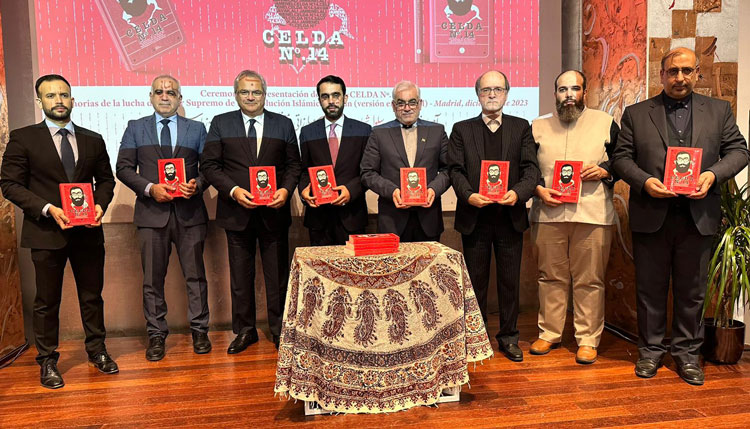Eduardo González
The last European Council of the Spanish Presidency of the Council of the EU concluded yesterday in Brussels with the historic decision to start the accession negotiations of Ukraine and Moldova, but, at the same time, without a consensus on the mid-term review of the Multiannual Financial Framework (MFF), the budget until 2027, on which aid of 50 billion euros for Kyiv depends. In both issues, the main obstacle was the Prime Minister of Hungary, Viktor Orbán.
In his usual optimistic tone, the President of the Government, Pedro Sánchez, yesterday gave a very positive assessment of the Council during the final press conference, in which he appeared alongside the President of the European Council, Charles Michel, and the President of the European Commission. , Ursula von der Leyen: “On July 1, I had the opportunity to begin the rotating Presidency with a trip to Kyiv, and to meet with (the President of Ukraine, Volodymyr) Zelensky to convey to him the manifest will of all the Member States of approve the historic agreement reached yesterday,” he declared. “It is an honor for Spain that the opening of Ukraine’s accession negotiations has taken place under our Presidency,” he added.
Sánchez spoke on Thursday night with Zelensky “to congratulate him on the decision of the European Council to open Ukraine’s accession negotiations to the EU,” according to the head of the Executive declared through X. “The Ukrainian people are one step closer close to fulfilling their aspirations for freedom and progress, the values that define our Union,” he continued. “We will continue to support Ukraine on this path,” he concluded.
For his part, Zelensky announced on the same social network that he had spoken with Sánchez to thank him “for his personal support for the important decision to start Ukraine’s accession talks to the EU.” “The Spanish Presidency of the EU concludes with a result so powerful that it will undoubtedly go down in history,” added the Ukrainian president.
The agreement on Ukraine and Moldova hung by a thread from the beginning because of Orbán’s staunch opposition. Finally, the Hungarian leader and the rest of the European leaders reached an agreement this past Thursday so that the Magyar prime minister would be absent from the room at the time of the vote in order to avoid Budapest’s veto. Orbán himself declared yesterday that he had decided to leave the room so that his country would not be burdened with this “bad decision.” In any case, he warned that he still has room to block the process and recalled that any accession of a new State requires the unanimous approval of the national Parliaments and, therefore, that the decision adopted this week in Brussels cannot be taken for granted. definitive.
Multiannual Financial Framework
Orbán was also the negative protagonist of the other major objective of the European summit in Brussels: the review of the Multiannual Financial Framework. After the green light at the beginning of the accession negotiations, the Hungarian prime minister warned in a radio interview that “Hungarians will not pay the economic consequences of this decision”, and the result was Budapest’s veto on the approval of an aid package for Ukraine valued at 50 billion euros. “I had to veto it,” he declared. Hungary’s blockade did not stop there and was extended to the mid-term review of the Multiannual Financial Framework (MFF), the budget until 2027, on which aid of 50 billion euros for Kyiv depends, precisely. “Summary of the night: veto of extra money for Ukraine and veto of the revision of the MFF,” Orban wrote in X in the early hours of Friday. “We will return to this issue next year at the European Council after adequate preparation,” he added.
Hungary has shown a rather fractious attitude towards the war in Ukraine almost from the beginning, sometimes helping to delay the adoption of sanctions against Russia, although without actually vetoing them. But in the case of the MFF, Orbán has been especially belligerent in retaliation for the European Commission’s decision to freeze around 22 billion euros from European recovery funds due to his doubts about the quality of the rule of law. in Hungary.
As explained by Charles Michel, the current negotiation box has the support of 26 member states. “We have 26 leaders who agree. Sweden has to consult with its Parliament, because it is its normal procedure, but there is one country that cannot. So we will try again early next year,” he declared. In any case, Michel highlighted the ability of the European heads of state and government to politically support the MPF negotiating body “in record time.” “Here, in a few hours, we have managed to make a balanced proposal with broad political support” and the support of 26 countries shows “that we are serious, that we want to be credible and that we want to do everything possible to protect and defend our fundamental needs”
Pedro Sánchez also saw the glass half full in this matter: “We have achieved something very important, and that is to reach an agreement at 26.” “There are 27 of us in the European Union and, therefore, I am convinced that, under the Belgian Presidency, in the next six months, we will count on the good work of Prime Minister Alexander de Croo to achieve this agreement at 27,” he continued. “I don’t know if it will be easier or more difficult than the previous agreement reached at 26, but, in any case, it will be up to him to achieve that much-needed update of the Financial Framework,” he added.







